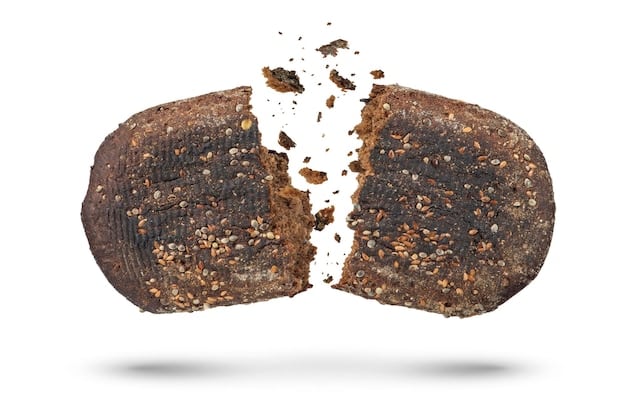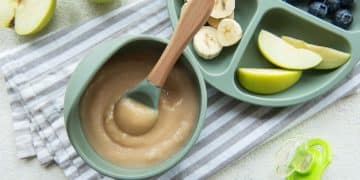Baby Constipation Relief: 7 Foods to Help & 3 to Avoid

Baby constipation can be distressing for both the infant and parents; however, dietary adjustments like incorporating prunes, pears, and broccoli can often alleviate the issue while avoiding binding foods such as rice cereal, bananas, and dairy can prevent it.
Experiencing baby constipation: 7 foods that can help (and 3 to avoid) can be a stressful time for any parent. Seeing your little one uncomfortable and straining can be heartbreaking. Fortunately, many gentle and natural solutions are available right in your kitchen. This guide will explore safe and effective dietary changes that can help ease your baby’s constipation and keep their digestive system happy and healthy.
Understanding Baby Constipation
Before diving into specific foods, it’s important to understand what constipation looks like in babies and what might be causing it. Constipation in infants differs from constipation in adults, and recognizing the signs is the first step in providing relief.
What is Baby Constipation?
Baby constipation is characterized by infrequent bowel movements, hard or pellet-like stools, and signs of straining or discomfort during bowel movements. It’s important to note that the frequency of bowel movements varies greatly among babies.
Some breastfed babies may have a bowel movement after every feeding, while others may only go once a week. Formula-fed babies tend to have more frequent bowel movements, typically once or twice a day. Constipation is usually diagnosed when a baby passes hard stools and shows signs of distress.
Common Causes of Constipation in Babies
Several factors can contribute to constipation in babies. Understanding these causes can help you take preventive measures and make informed dietary choices.
- Dietary Changes: Introducing solid foods or switching formulas can sometimes lead to constipation. A baby’s digestive system needs time to adjust to new foods.
- Dehydration: Not getting enough fluids can result in harder stools. Babies need adequate hydration to keep their bowel movements regular.
- Insufficient Fiber Intake: A diet lacking in fiber can lead to constipation. Fiber helps add bulk to the stool, making it easier to pass.
- Medical Conditions: In rare cases, underlying medical conditions, such as Hirschsprung’s disease or hypothyroidism, can cause constipation.
Recognizing these causes can guide you in choosing the right foods to help relieve and prevent constipation in your baby.

In summary, understanding the nuances of baby constipation involves recognizing its symptoms and identifying its potential causes. By being attentive to your baby’s bowel habits and making informed dietary choices, you can effectively address and prevent constipation.
7 Foods That Can Help Relieve Baby Constipation
When your baby is constipated, certain foods can help ease their discomfort and promote regular bowel movements. These foods are generally high in fiber and have natural laxative properties.
Prunes
Prunes are a well-known remedy for constipation due to their high fiber content and natural sugars, including sorbitol, which has a laxative effect. Prunes are a gentle yet effective way to stimulate bowel movements.
You can offer prunes in various forms, such as prune juice, prune puree, or even whole prunes if your baby is old enough to chew them safely. Start with a small amount, like 2-4 ounces of prune juice for babies over six months old, and observe how your baby responds. Prunes are generally safe and effective, but it’s always wise to introduce them gradually to avoid any digestive upset.
Pears
Pears are another excellent option for relieving constipation in babies. Like prunes, pears contain fiber and sorbitol, which help soften stools and promote bowel movements. They are also mild in flavor and easy to digest, making them a good choice for sensitive tummies.
Pears can be offered as a puree, juice, or as small, soft pieces depending on your baby’s age and developmental stage. You might begin with a couple of tablespoons of pear puree and watch how your baby reacts. Pears are not only effective in relieving constipation but also provide essential nutrients like vitamin C and potassium, supporting overall health.
Broccoli
Broccoli is a nutrient-rich vegetable that can aid in relieving constipation. It’s high in fiber and contains compounds that support healthy digestion. However, due to its cruciferous nature, introduce broccoli in small quantities to avoid gas or discomfort.
- Preparation Matters: Steam or cook broccoli until it is soft and easy to mash or puree.
- Start Small: Begin with a small serving (1-2 tablespoons) to monitor how your baby tolerates it.
- Combination: Mix broccoli puree with other well-tolerated foods like applesauce to enhance flavor and acceptance.
By incorporating these foods into your baby’s diet carefully, you can help alleviate constipation and promote regularity. Always introduce new foods gradually and watch for any signs of allergic reactions or digestive discomfort.

Overall, these seven foods offer natural ways to help relieve baby constipation by leveraging their high fiber content and mild laxative effects. Incorporating them thoughtfully into your baby’s diet can ease their discomfort and promote healthier digestion.
Foods to Approach with Caution
While some foods can help relieve constipation, others may worsen it. It’s important to be aware of which foods can potentially contribute to constipation so you can avoid or limit them in your baby’s diet.
Rice Cereal
Rice cereal is often recommended as a first food for babies due to its bland taste and easy digestibility. However, it’s low in fiber and can contribute to constipation in some infants. The lack of fiber means it doesn’t add bulk to the stool, making it harder to pass.
If you’re introducing rice cereal, consider alternative cereals with higher fiber content, such as oatmeal or barley cereal. These options provide more fiber, which can help promote regular bowel movements. If you continue to use rice cereal, make sure your baby gets plenty of fluids and fiber from other sources to counteract its constipating effects.
Bananas
Bananas are a convenient and nutritious snack for babies. However, unripe bananas can sometimes contribute to constipation. Unripe bananas contain high amounts of tannins, which can slow down the digestive process and harden stools.
Ensure the bananas you offer your baby are ripe. Ripe bananas are softer and easier to digest and contain more fiber, which can help prevent constipation. If your baby is prone to constipation, limit their intake of bananas and prioritize other fruits with higher fiber content, such as pears or prunes.
Dairy Products
Dairy products, such as cow’s milk and cheese, can sometimes cause constipation in babies. Some infants may have difficulty digesting the proteins in cow’s milk, leading to digestive issues like constipation. Additionally, dairy products are low in fiber, which can further contribute to harder stools.
If you suspect your baby is constipated due to dairy, discuss alternative milk options with your pediatrician, such as soy or nut-based milk. If your baby is already on formula, consider a hypoallergenic formula that’s easier to digest. Additionally, ensure your baby is getting enough fiber from other food sources to balance out the low fiber content of dairy products.
In short, being mindful of foods like rice cereal, unripe bananas, and dairy products can help prevent or alleviate constipation in babies. Adjustments to your baby’s diet, along with advice from your pediatrician, can ensure their digestive health.
Other Helpful Tips to Prevent Baby Constipation
Besides dietary changes, several other strategies can help prevent and relieve constipation in babies. These include ensuring adequate hydration, encouraging physical activity, and trying gentle abdominal massage.
Ensure Adequate Hydration
Dehydration can lead to harder stools and constipation. Making sure your baby gets enough fluids is essential, especially when introducing solid foods. For breastfed babies, frequent nursing can provide adequate hydration. Formula-fed babies may need additional water, especially in hot weather.
Offering small amounts of water between feedings can help keep your baby hydrated. For babies over six months, you can also offer diluted fruit juices, such as prune or pear juice, which can help soften stools due to their sorbitol content. Monitor your baby’s urine output to ensure they are adequately hydrated. A sufficient output is a good indicator of proper hydration.
Encourage Physical Activity
Physical activity can help stimulate bowel movements and prevent constipation. Gentle exercises and play can promote healthy digestion. Encourage your baby to move and be active throughout the day.
- Bicycle Legs: Gently move your baby’s legs in a bicycling motion while they are lying on their back. This can help stimulate their digestive system.
- Tummy Time: Encourage tummy time, as it can help strengthen abdominal muscles and promote bowel movements.
- Playtime: Engage in active play with your baby. Movement can encourage regular bowel movements.
Gentle Abdominal Massage
Massaging your baby’s abdomen can help stimulate their bowels and relieve constipation. A gentle abdominal massage can help move stool through their system more easily. Use a circular motion with light pressure.
Start by placing your fingertips on your baby’s abdomen and gently massage in a clockwise direction. Follow the “I Love You” technique: massage in a downward motion on the left side (I), then from left to right across the upper abdomen (Love), and then down the right side (You). This mimics the natural path of the colon.
These additional tips—ensuring hydration, promoting activity, and gentle massage—offer complementary approaches to managing and preventing baby constipation, alongside dietary changes.
When to Consult a Pediatrician
While many cases of baby constipation can be managed with dietary changes and home remedies, it’s important to know when to seek professional medical advice. Consulting a pediatrician can help rule out underlying medical conditions and ensure your baby receives the appropriate care.
Signs That Warrant a Doctor’s Visit
There are certain signs and symptoms that indicate a need for a pediatrician’s evaluation. These include:
- Blood in Stool: If you notice blood in your baby’s stool, it’s important to consult your pediatrician.
- Persistent Constipation: If constipation persists for more than a week despite dietary changes, seek medical advice.
- Abdominal Swelling: Abdominal swelling or distension can indicate a more serious problem.
Underlying Medical Conditions to Consider
In rare cases, constipation may be a symptom of an underlying medical condition that requires specific treatment.
Such conditions include Hirschsprung’s disease, which affects the large intestine, and hypothyroidism, where the thyroid gland is underactive. Your pediatrician can perform tests to diagnose or rule out these conditions.
Questions to Ask Your Pediatrician
When you visit the pediatrician, be prepared with a list of questions to help you better understand your baby’s condition and how to manage it.
Ask about the underlying cause of the constipation, potential treatments or interventions, and dietary changes to implement. Also, ask about signs that warrant further medical attention. Having these questions answered can provide reassurance and guide you in providing the best care for your baby.
In general, while most instances of baby constipation are manageable at home, knowing when to involve a pediatrician is essential for the health and well-being of your child. Prompt medical advice can address any underlying issues and ensure proper care.
Expert Tips for Managing Baby’s Diet and Constipation
Navigating your baby’s diet requires understanding specific strategies to prevent and manage constipation. Consulting with pediatricians and nutritionists can provide valuable insights.
Introduce New Foods Gradually
Introducing new foods one at a time helps identify potential triggers for constipation or allergies. When starting solid foods, offer single-ingredient purees and wait a few days before introducing another new food.
This gradual introduction allows you to monitor how your baby’s digestive system reacts to each food, making it easier to identify potential culprits if constipation occurs. Keep a log of the foods you introduce and any corresponding symptoms. This method ensures your baby’s system adjusts well to each new addition.
Balance Fiber Intake
Balancing fiber intake is crucial for maintaining regular bowel movements in babies. While fiber is beneficial, too much too soon can also cause digestive discomfort.
- High-Fiber Foods: Incorporate high-fiber foods like prunes, pears, and broccoli in appropriate amounts.
- Monitor Reactions: Observe how your baby reacts to increased fiber and adjust servings accordingly.
- Variety: Ensure a variety of fiber sources for balanced nutrition.
Consult with a Nutritionist
Consulting with a nutritionist can help create a tailored dietary plan for your baby, addressing their specific needs. Nutritionists are experts in infant nutrition and can provide guidance on managing digestive issues like constipation.
They can assess your baby’s current diet, identify potential deficiencies or imbalances, and recommend adjustments to promote healthy digestion. Nutritionists can also offer advice on introducing new foods, managing food allergies, and ensuring your baby receives optimal nutrition for growth and development.
These expert tips contribute to managing your baby’s diet effectively, especially with regard to constipation. From gradual introductions and fiber balance to professional consultations, you can ensure a healthy digestive system for your baby.
| Key Point | Brief Description |
|---|---|
| 👶 Prunes | High in fiber and sorbitol, acting as a natural laxative. Start with small amounts. |
| 🍐 Pears | Contain fiber and sorbitol to soften stools. Best in puree or juice form. |
| 🥦 Broccoli | Fiber-rich vegetable. Steam until soft and mix with other purees. |
| 💧 Hydration | Ensure adequate fluid intake, especially when introducing solids. |
Frequently Asked Questions
▼
Signs include infrequent bowel movements (less than usual), hard or pellet-like stools, straining, and visible discomfort. Remember, the frequency varies among babies.
▼
For babies over six months, start with 2-4 ounces of prune juice. Monitor their reaction and adjust accordingly. Always dilute the juice with water.
▼
Unripe bananas can cause constipation due to high tannin content. Ripe bananas are less likely to constipate and offer more fiber.
▼
Yes, gently move your baby’s legs in a bicycling motion and encourage tummy time. These activities can help stimulate their digestive system.
▼
Consult a pediatrician if you notice blood in the stool, persistent constipation (over a week), or abdominal swelling. These could indicate underlying issues.
Conclusion
Managing baby constipation: 7 foods that can help (and 3 to avoid) often involves simple dietary adjustments and gentle home remedies. By incorporating fiber-rich foods like prunes, pears, and broccoli into your little one’s diet and avoiding constipating options such as rice cereal and unripe bananas, you can promote regular bowel movements and ease their discomfort. Remember to consult with your pediatrician for personalized advice and to rule out any underlying medical conditions.





